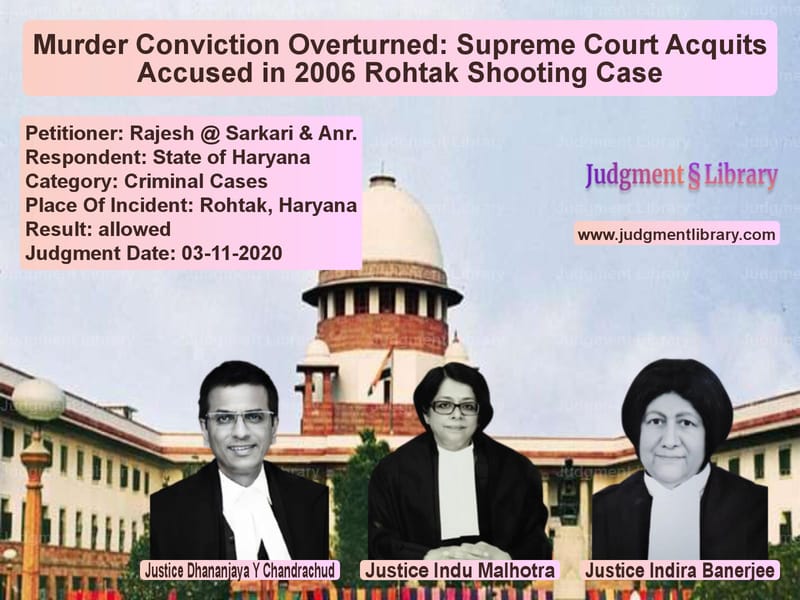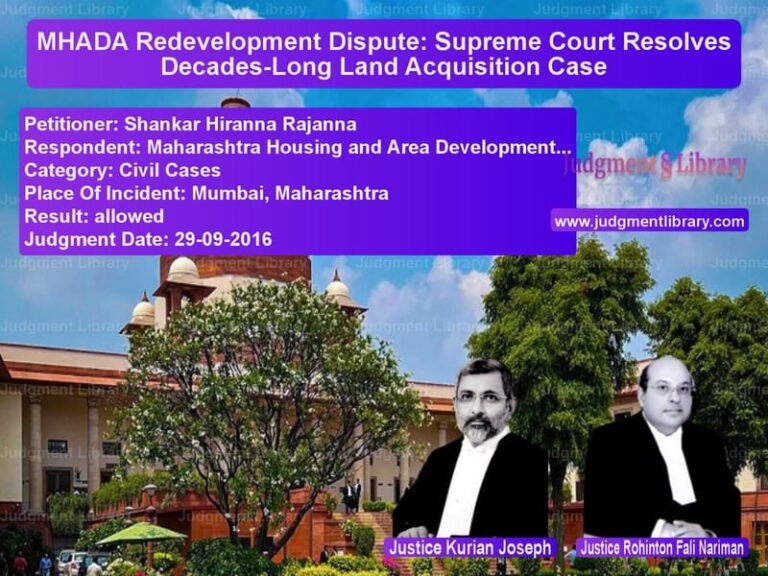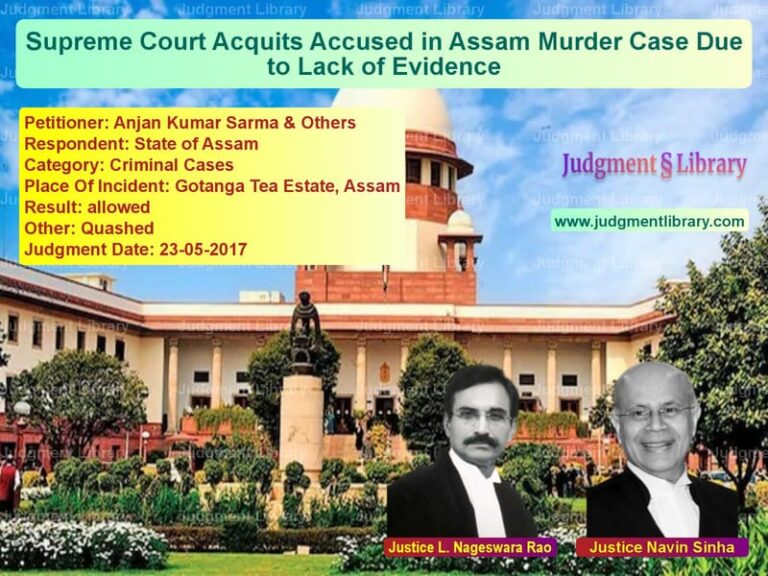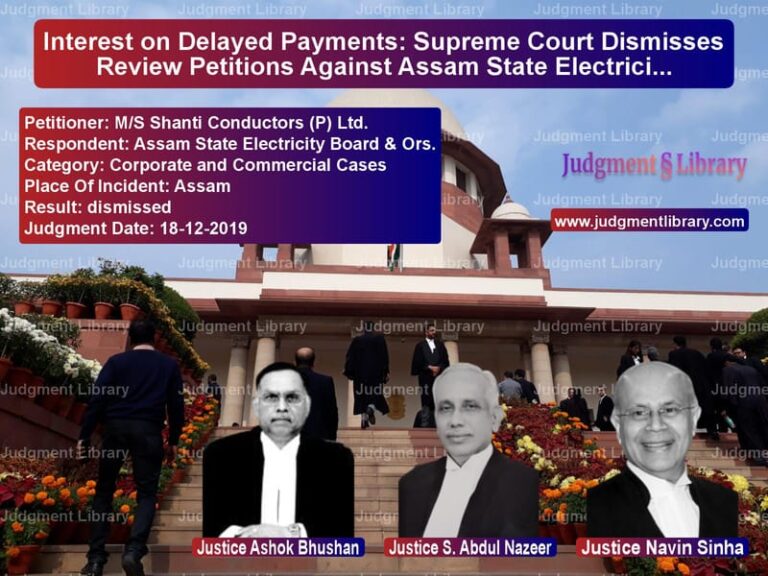Murder Conviction Overturned: Supreme Court Acquits Accused in 2006 Rohtak Shooting Case
The Supreme Court of India has overturned the conviction of Rajesh alias Sarkari and Ajay Hooda, accused in the 2006 murder of law student Sandeep Hooda in Rohtak, Haryana. The appellants were previously sentenced to life imprisonment under Section 302 read with Section 34 of the Indian Penal Code (IPC) but were acquitted due to discrepancies in the prosecution’s case and failure to prove guilt beyond a reasonable doubt.
Background of the Case
The case revolved around the murder of Sandeep Hooda, a final-year law student at Maharishi Dayanand University, Rohtak. On December 26, 2006, Sandeep was allegedly shot dead near the university’s law department by six individuals. His father, Azad Singh, lodged an FIR based on his eyewitness testimony, claiming that he and his younger son, Sunil, had seen the accused firing at Sandeep.
The case went to trial, and in 2012, the Sessions Court convicted the accused, sentencing them to life imprisonment. The Punjab and Haryana High Court upheld this conviction in 2019. However, the Supreme Court found several inconsistencies in the prosecution’s case, leading to the acquittal of the accused.
Arguments by the Petitioner
Rajesh alias Sarkari and Ajay Hooda, through their counsel, presented the following key arguments:
- The eyewitnesses, Azad Singh (PW4) and Sunil Singh (PW5), were not present at the scene of the crime as claimed. Their statements in court contained significant improvements over their initial FIR.
- The First Information Report (FIR) stated that Sandeep was taken to the hospital by Parveen, son of Zile Singh Hooda, but in their court testimonies, PW4 and PW5 claimed they had taken him themselves.
- The forensic evidence was unreliable, with discrepancies in the forensic science laboratory (FSL) reports regarding the bullets and weapons allegedly used in the murder.
- The accused had refused to undergo a Test Identification Parade (TIP) because they were already known to the complainant due to previous legal encounters.
Arguments by the Respondent
The State of Haryana defended the conviction, arguing that:
- The complainant and his son were present at the scene and identified the accused in court.
- The medical and ballistic evidence corroborated the prosecution’s version of events.
- The refusal of the accused to undergo TIP indicated a guilty conscience.
- The presence of multiple firearm injuries on the deceased suggested the involvement of more than one accused.
Supreme Court’s Observations
The Supreme Court analyzed the case and found multiple flaws in the prosecution’s evidence:
- Eyewitness Testimonies: The Court noted that the complainant and his son’s depositions were inconsistent with the FIR. The initial FIR mentioned that the deceased was taken to the hospital by a third party, while in court, the complainant claimed he took his son himself.
- Ballistics Evidence: The forensic reports contained contradictions regarding the bullets and the firearms. The Supreme Court stated that “the prosecution has failed to establish the connection between the firearms allegedly recovered and the bullets found at the crime scene.”
- Non-examination of Key Witnesses: The defense produced two witnesses, DW4 and DW5, who stated that the complainant and his son were not present at the crime scene. However, the prosecution did not call these individuals for cross-examination.
- Failure to Examine Ballistic Experts: The Supreme Court pointed out that “the failure of the prosecution to examine the authors of the forensic reports creates serious doubt about the credibility of the evidence.”
- Test Identification Parade: The Court ruled that an adverse inference could not be drawn against the accused for refusing TIP since they were already known to the complainant from a prior legal case.
Final Judgment
After examining all the evidence, the Supreme Court concluded that the prosecution had failed to prove the case beyond a reasonable doubt. The Court ruled:
“For the above reasons, we have arrived at the conclusion that the prosecution has failed to establish its case beyond reasonable doubt. The appellants are, hence, entitled to the benefit of doubt and are acquitted of the offence with which they have been charged.”
The Court ordered the immediate release of the accused, stating that they had already served 12 years in prison. The appeal was allowed, and the bail bonds of the accused were canceled.
Conclusion
This landmark judgment underscores the importance of a fair trial and adherence to proper legal procedures. The Supreme Court reaffirmed the principle that an accused cannot be convicted merely on the basis of suspicion, and the prosecution must establish guilt beyond a reasonable doubt. The ruling serves as a reminder of the judiciary’s role in protecting constitutional rights and ensuring justice is not compromised by procedural lapses.
Petitioner Name: Rajesh @ Sarkari & Anr..Respondent Name: State of Haryana.Judgment By: Justice Dhananjaya Y Chandrachud, Justice Indu Malhotra, Justice Indira Banerjee.Place Of Incident: Rohtak, Haryana.Judgment Date: 03-11-2020.
Don’t miss out on the full details! Download the complete judgment in PDF format below and gain valuable insights instantly!
Download Judgment: Rajesh @ Sarkari & A vs State of Haryana Supreme Court of India Judgment Dated 03-11-2020.pdf
Direct Downlaod Judgment: Direct downlaod this Judgment
See all petitions in Murder Cases
See all petitions in Bail and Anticipatory Bail
See all petitions in Fundamental Rights
See all petitions in Judgment by Dhananjaya Y Chandrachud
See all petitions in Judgment by Indu Malhotra
See all petitions in Judgment by Indira Banerjee
See all petitions in allowed
See all petitions in supreme court of India judgments November 2020
See all petitions in 2020 judgments
See all posts in Criminal Cases Category
See all allowed petitions in Criminal Cases Category
See all Dismissed petitions in Criminal Cases Category
See all partially allowed petitions in Criminal Cases Category






